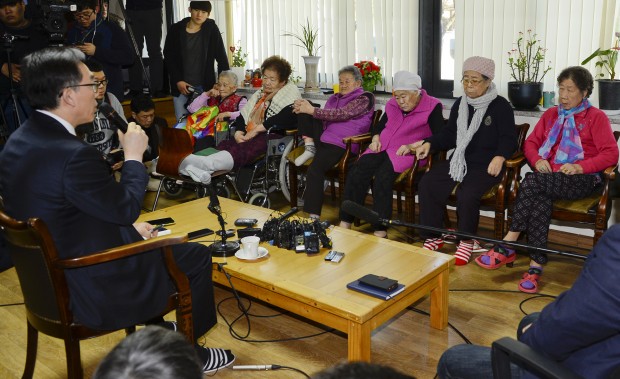“Comfort women” enraged by the deal between Korea and Japan

South Korean Second Vice Foreign Minister Cho Tae-yul, left, talks to the former South Korean sex slaves, who were forced to serve for the Japanese Army during World War II, at the House of Sharing where the home for the living sex slaves, in Gwangju, South Korea, Tuesday, Dec. 29, 2015. (Kim Min-hee/Pool Photo via AP)
A day after the irreversible settlement of a decades-long standoff over Korean women forced into sexual slavery by Japan’s WWII military, there’s relief among South Korean and Japanese diplomats, fury among activists and many of the elderly victims and general public indifference in both countries.
South Korean first and second vice foreign ministers Cho Tae-yul and Im Sung Nam held a meeting with some of the surviving victims of Japan’s sex slavery to make them fully comprehend the newly established deal which aims to settle the tension between the two countries.
Some of the victims denounced the deal considering it a political collusion between the two countries and it doesn’t satisfy their demands. One of the victims, 88-year-old Lee Young Soo said, “Why are you trying to murder us for a second time around? Shouldn’t you have met with the victims before you negotiated?” She continued, “Are you a Japanese ambassador? Are you of their ilk? Why are you trying to murder us again, we who suffered because we had no country, because our nation was weak? When a survivor of history is alive like this…we are Korea’s daughters who are still clearly alive. Why do you never think of us?”
Other victims such as 89-year-old Kim Bok Dong and 90-year-old Kim Kong Ja shared the same dissatisfaction with the deal, saying that the government should’ve consulted them first.
Im Sung Nam said that their main objective was to regain the dignity of the victims before they died, as only 46 are alive at the moment. He also said that they couldn’t consult them because there were other considerations when it comes to the other end of the negotiations.
Cho Tae-yul and Im Sung Nam met with different survivors in Seoul and Gwangju as they tried to persuade them to understand the deal. Cho Tae-yul said that this was the first time Shinzo Abe, Japan’s prime minister, made a public apology on Japan’s crimes during the war.










































